Local News
Local musical theatre veteran expresses her admiration for Winnipeg Music Festival talent
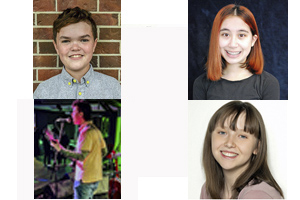
By MYRON LOVE Regular readers of The Jewish Post & News will no doubt be aware that this writer has been highlighting the outstanding achievement of younger members of our community competing in the annual Winnipeg Music Festival. This year, however, I am taking a slightly different approach with a focus on the other side of the equation – that is, on one of the judges.
Debbie Maslowsky has been a fixture of the musical theatre scene in Winnipeg for almost as long as I can remember. Her career started in high school and continued through Rainbow Stage, the Royal Manitoba Theatre Centre, the Winnipeg Jewish Theatre and much more – including numerous Yiddish concerts in partnership with her late brother, Jerry.
This year though, was the first time that she was asked to be an adjudicator for the Winnipeg Music Festival’s musical theatre category and, she confesses, she was blown away by the talent that was on display.
“It was soul-filling,” she says, “especially after these last couple of years. I was impressed by the commitment of the young performers. I also have to credit the accompanists and voice teachers in helping to choose the right material for the participants.”
Maslowsky herself notes that she has never competed in the Music Festival. “Music theatre wasn’t one of the categories when I was growing up,” she observes. “And I wasn’t that competitive.”
She came to the festival this year through a recommendation from a voice teacher, she reports, based on experience gained over many years as a teacher of musical theatre and coach.
“The adjudicators work within specific guidelines, she says. “We are not looking necessarily for the best singer, but rather, base our decisions on the overall performance including gestures, movement and confidence.”
She points out that songs today are more story-driven than they used to be. Reflecting that, she points out, the festival organizers this year, for the first time, separated the musical theatre category into songs written before 1995 and after –with more recent songs conveying a lot more information aimed at driving the story.
Maslowsky reports that she was overwhelmed by the sheer number of submissions – more than 200 – all of which were virtual performances. “They were all wonderful and interesting in different ways,” she says.
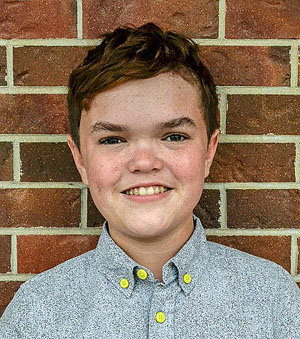
One of those performances that obviously got her eye was that of Yale Rayburn-Vander Hout who scored a first place standing in the CLASS 1257C MUSICALS 1965 TO 1999, UP TEMPO, 16 YEARS AND UNDER category with his interpretation of “Mr. Cellophane” from the musical “Chicago”.
He was also in the running for the Rainbow Stage Trophy.
Last year, the 15-year-old son of Samantha and Peter was runner-up in in two categories – Vocal Solo, Musical Theatre, Up Tempo and Ballad, for males, 16 and under.
The Grade 10 Gray Academy student has been studying voice with Kelly Robinson for six years and was scheduled to appear in Rainbow Stage’s 2020 production of “the Wizard of Oz”, which was, however, cancelled due to Covid. He has also taken part in his school’s musical productions.
“I feel real good about my performance at the Music Festival this year and am looking forward to competing again next year,” he says.
He adds that he is hoping to pursue a career in musical theatre.
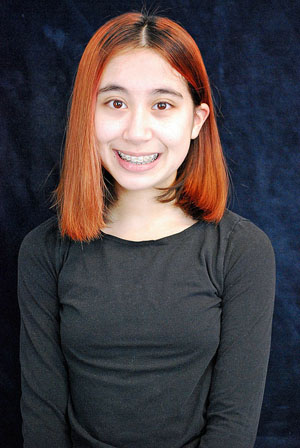
Also under consideration for the Rainbow Stage Trophy this year was Hannah Schaeffer, who finished first in CLASS 1207E-14 MUSICALS 2000 TO PRESENT, UP TEMPO, 14 YEARS AND UNDER category – with a performance of “Watch What Happens” from the musical “Newsies” – and was runner up in the CLASS 1207D-14 MUSICALS 1965 TO 1999, BALLAD, 14 YEARS AND UNDER category for “Home” from “The Wiz”.
This is the fourth year that the older daughter of Marc Schaeffer and Kai Sasake has participated. Last year, the then Grade 8 Grant Park Student finished first in the Vocal Solo, Musical Theatre, Ballad, Girls, 14 and under and was recommended for the provincial competition. The year before, she had a second-place finish as part of a vocal trio. In 2019, she won gold in the Vocal Solo, TV and movie musicals at the Girls 12 and under category and scored a first place finish as part of a trio in the Musical Theatre Grade B level. That year, she was also the recipient of a Winnipeg Music Festival scholarship.
“I am looking forward to competing in next year’s festival, too,” she says.
The young singer has been taking singing lessons for six years and participates in her school’s musicals. She is scheduled to sing the role of Roxie Hart in the upcoming Grant Park High School production of “Chicago” in April.
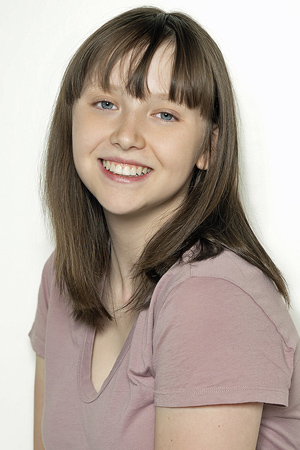
New to the Festival winner’s circle this year is Zoe Reider, who finished first in the Class 1692 Vocal Duet, Musical Theatre, 16 years, and who has been singing under Geoffrey Heal. The 15-year-old Gray Academy student says that she feels good about her – and her partner’s – performance and is proud to have finished first in her category.
The daughter of Ray Reider has been studying musical theatre with Brenda Gorlick at Winnipeg Studio Theatre for the past six years, at the Theatre Dance Centre under the direction of Kathleen Henry, and at Meraki Theatre Productions, which was founded by Taylor Gregory. Zoe notes that she also teaches dance at Meraki.
She notes that she has acted in several Fringe Festival shows.
“My goal is to appear on Broadway,” she says
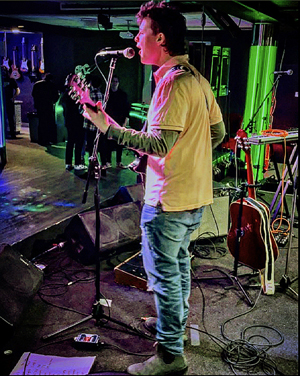
In the instrumental part of the Festival, Gregory Hyman once again shone. The 13-year-old son of Hartley and Rishona Hyman scored gold twice, playing classical guitar – Once in the category of Romantic Composers and a second time for a piece of his own choosing.
“I am happy to have won again,” says the Grade 8 St. John’s-Ravenscourt student. (This was the fifth year in a row that he has competed in the Festival.) “I enjoy the challenge of competing in the Festuival.”
Gregory has been studying guitar since he was five and has been taking voice lessons for the past five years.
Nor does he restrict his music making just to the yearly festival. Two years ago, he launched a career as a musician, producer and podcaster. His podcast, “Talk and Rock with Gregory Hyman,” now in its third season, features him interviewing various people in the music business across Canada. Two years ago the young talent, who has also taught himself electric and acoustic guitar, and who goes under the professional name “GMH Rocks”, released his first album, “Basement”, on all streaming platforms. He followed that with a single release in February 2021, and a new album this past February.
Local News
Winnipeg Jewish Theatre breaks new ground with co-production with Rainbow Stage

By MYRON LOVE Winnipeg Jewish Theatre is breaking new ground with its first ever co-production with Rainbow Stage. The new partnership’s presentation of “Fiddler on the Roof” is scheduled to hit the stage at our city’s famed summer musical theatre venue in September 2026.
“We have collaborated with other theatre companies in joint productions before,” notes Dan Petrenko, the WJT’s artistic and managing director – citing previous partnerships with the Segal Centre for the Performing Arts in Montreal, the Harold Green Jewish Theatre in Toronto, Persephone Theatre in Saskatoon and Winnipeg’s own Dry Cold Productions. “Because of the times we’re living through, and particularly the growing antisemitism in our communities and across the country, I felt there is a need to tell a story that celebrates Jewish culture on the largest stage in the city – to reach as many people as possible.”
Last year, WJT approached Rainbow Stage with a proposal for the co-presentation of “Fiddler on the Roof.” Rainbow Stage management was really enthusiastic in their response, Petrenko reports.
“We are excited to be working with Winnipeg’s largest musical theatre company,” he notes. “Rainbow Stage has an audience of more than 10,000 people every season. Fiddler is a great, family-oriented story and, through our joint effort with Rainbow Stage, WJT will be able to reach out to new and younger audiences.”
“We are also working to welcome more diverse audiences from other communities, as well as newcomers – families who have moved here from Israel, Argentina and countries of the former Soviet Union.”
Helping Petrenko to achieve those goals are two relatively new and younger additions to WJT’s management team. Both Company Manager Etel Shevelev, and Head of Marketing Julia Kroft are in their 20s – as is Petrenko himself.
Kroft, who is also Gray Academy’s Associate Director of Advancement and Alumni Relations, needs little or no introduction to many readers. In addition to her work for Gray Academy and WJT, the daughter of David and Ellen Kroft has been building a second career as a singer and actor. Over the past few years, she has performed by herself or as part of a musical ensemble at Jewish community events, as well as in various professional theatre productions in the city.
Etel Shevelev is also engaged in a dual career. In addition to working full time at WJT, she is also a Fine Arts student (majoring in graphic design) at the University of Manitoba. Outside of school, she is an interdisciplinary visual artist (exhibiting her work and running workshops), so you can say the art world is no stranger to her.
(She will be partcipating in Limmud next month as a member of the Rimon Art Collective.)
Shevelev grew up in Kfar Saba (northeast of Tel Aviv). She reports that in Israel she was involved in theatre from a young age. “In 2019, I graduated from a youth theatre school, which I attended for 11 years.” In a sense, her work for WJT brings her full circle.
She arrived in Winnipeg just six years ago with her parents. “I was 19 at the time,” she says.
After just a year in Winnipeg, her family decided to relocate to Ottawa, while she chose to stay here. “I was already enrolled in university, had a long-term partner, and a job,” she explains. “I felt that I was putting down roots in Winnipeg.”
Etel expects to graduate by the end of the academic year, allowing her to focus on the arts professionally full-time.
In her role as company manager, Shevelev notes, she is responsible for communications with donors, contractors, and unions, as well as applying for various grants and funding opportunities.
In addition, her linguistic skills were put to use last spring for WJT’s production of “The Band’s Visit,” a story about an Egyptian band that was invited to perform at a cultural centre opening ceremony in the lively centre of Israel, but ended up in the wrong place – a tiny, communal town in southern Israel. Shevelev was called on to help some of the performers with the pronunciation of Hebrew words and with developing a Hebrew accent.
“I love working for WJT,” she enthuses. “Every day is different.”
Shevelev and Petrenko are also enthusiastic about WJT’s next production – coming up in April: “Ride: The Musical” debuted in London’s West End three years ago, and then went on to play at San Diego’s Old Globe theatre to rave reviews. The WJT production will be the Canadian premiere!
The play, Petrenko says, is based on the true story of Annie Londonderry, a young woman – originally from Latvia, who, in 1894, beat all odds and became the first woman to circle the world on a bicycle.
Petrenko is also happy to announce that the director and choreographer for the production will be Lisa Stevens – an Emmy Award nominee and Olivier Award winner. (The Olivier is presented annually by the Society of London Theatre to recognize excellence in professional London theatre).
“Lisa is in great demand across Canada, and the world really,” the WJT artistic director says. “I am so thrilled that we will be welcoming one of the greatest Jewish directors and choreographers of our time to Winnipeg this Spring.”
For more information about upcoming WJT shows, readers can visit wjt.ca, email the WJT office at info@wjt.ca or phone the box office at 204-477-7515.
Local News
Rising Canadian comedy star Rob Bebenek to headline JCFS’ second annual “Comedy for a Cause”

By MYRON LOVE Last year, faced with a federal government budget cut to its Older Adult Services programs, Jewish Child and Family Service launched a new fundraising initiative. “Comedy with a Cause” was held at Rumor’s Comedy club and featured veteran Canadian stand-up comic Dave Hemstad.
That evening was so successful that – by popular demand – JCFS is doing an encore. “We were blown away by the support from the community,” says Al Benarroch, JCFS’s president and CEO.
“This is really a great way to support JCFS by being together and having fun,” he says.
“Last year, JCFS was able to sell-out the 170 tickets it was allotted by Rumor’s,” adds Alexis Wenzowski, JCFS’s COO. “There were also general public attendees at the event last year. Participants enjoyed a fun evening, complete with a 50/50 draw and raffle. We were incredibly grateful for those who turned out, the donors for the raffle baskets, and of course, Rumor’s Comedy Club.
“Feedback was very positive about it being an initiative that encouraged people to have fun for a good cause: our Older Adult Services Team.”
This year’s “Comedy for a Cause” evening is scheduled for Wednesday, February 25. Wenzowski reports that this year’s featured performer, Rob Bebenek, first made a splash on the Canadian comedy scene at the 2018 Winnipeg Comedy festival. He has toured extensively throughout North America, appearing in theatres, clubs and festivals. He has also made several appearances on MTV as well as opening shows for more established comics, such as Gerry Dee and the late Bob Saget.
For the 2026 show, Wenzowski notes, Rumors’ is allotting JCFS 200 tickets. As with last year, there will also be some raffle baskets and a 50/50 draw.
“Our presenting sponsors for the evening,” she reports, “are the Vickar Automotive Group and Kay Four Properties Incorporated.”
The funds raised from this year’s comedy evening are being designated for the JCFS Settlement and Integration Services Department. “JCFS chose to do this because of our reduction in funding last year by the federal government to this department,” Wenzowski points out.
“Last year alone,” she reports, “our Settlement and Integration Services team settled 118 newcomer families – from places like Israel, Mexico, Brazil, and Argentina. Each year, our program supports even more newcomer families with things like case management, supportive counselling, employment coaching, workshops, programming for newcomer seniors, and more.”
“We hope to raise more than $15,000 through this event for our Settlement and Integration Program,” Al Benarroch adds. “The team does fantastic work, and we know that our newcomer Jewish families need the supports from JCFS. I want to thank our sponsors, Rumor’s Comedy Club, and attendees for supporting us.”
Tickets for the show cost $40 and are available to purchase by calling JCFS (204-477-7430) or by visiting here: https://www.zeffy.com/en-CA/ticketing/jcfs-comedy-for-a-cause. Sponsorships are still available.
Local News
Ninth Shabbat Unplugged highlight of busy year for Winnipeg Hillel

By MYRON LOVE Lindsay Kerr, Winnipeg’s Hillel director, is happy to report that this year’s ninth Shabbat UnPlugged, held on the weekend of January 9-11, attracted approximately 90 students from 11 different universities, including 20 students who were from out of town.
Shabbat UnPlugged was started in 2016 by (now-retired) Dr. Sheppy Coodin, who was a science teacher at Gray Academy, along with fellow Gray Academy teacher Avi Posen (who made aliyah in 2019) – building on the Shabbatons that Gray Academy had been organizing for the school’s high school students for many years.
The inaugural Shabbat UnPlugged was so successful that Coodin and Posen did it again in 2017 and took things one step further by combining their Shabbat UnPlugged with Hillel’s annual Shabbat Shabang Shabbaton that brings together Jewish university students from Winnipeg and other Jewish university students from Western Canada.
As in the past, this year’s Shabbat UnPlugged weekend was held at Lakeview’s Hecla Resort. “What we like about Hecla,” Kerr notes, “is that they let us bring in our own kosher food, it is out of the city and close to nature for those who want to enjoy the outdoors.”
The weekend retreat traditionally begins with a candle lighting, kiddush and a traditional Shabbat supper. Unlike previous Shabbats UnPlugged, Kerr points out, there were no outside featured speakers this year. All religious services and activities were led by students or national program partners.
The weekend was funded in part by grants from CJPAC and StandWithUs Canada, along with the primary gift from The Asper Foundation.
Kerr reports that the activities began with 18 of our local Jewish university students participating in a new student Shabbaton – inspired by Shabbat Unplugged, titled “Roots & Rising.”
In addition to Shabbat Unplugged, Hillel further partnered with Chabad for a Sukkot program in the fall, as well as with Shaarey Zedek Congregation and StandWithUs Canada for a Chanukah program. Hillell also featured a commemoration of October 7, an evening of laser tag and, in January, a Hillel-led afternoon of ice skating.
Coming up this month will be a visit to an Escape Room – and a traditional Shabbat dinner in March.
Kerr estimates that there are about 300 Jewish students at the University of Manitoba and 100 at the University of Winnipeg.
“Our goal is to attract more Jewish students to take part in our programs and connect with our community,” she comments.


